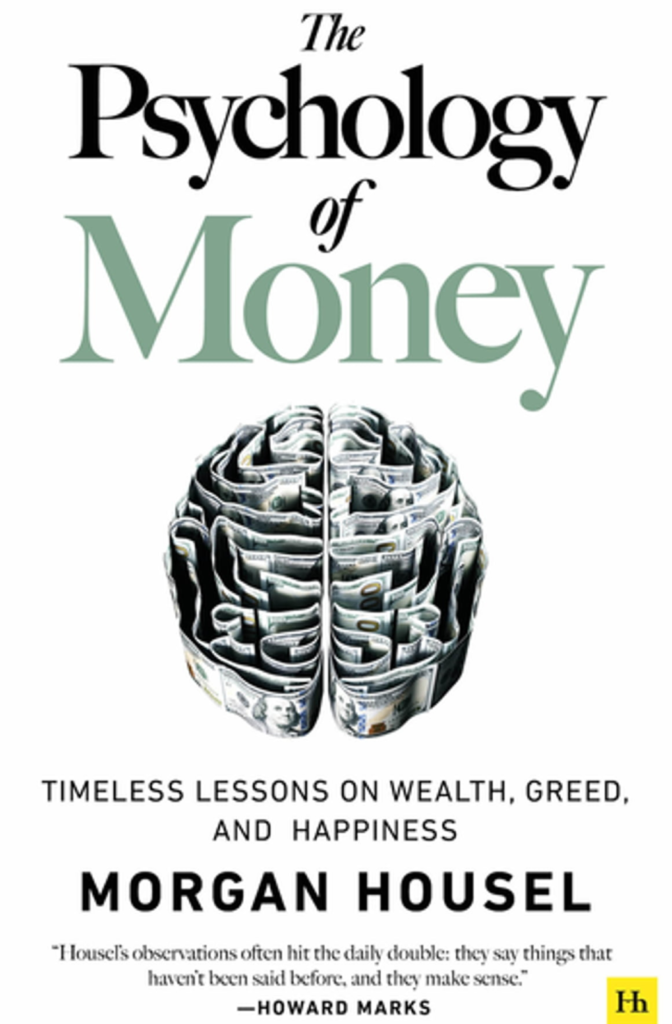
Doing well with money isn’t necessarily about what you know. It’s about how you behave. And behaviour is hard to teach, even to brilliant people. Money―investing, finance and business decisions―is typically conducted as a math-based field, where data and formulas tell you what to do. But people don’t make financial decisions on a spreadsheet in the real world. In The Psychology of Money, award-winning author Morgan Housel shares stories exploring the strange ways people think about money and teaches you how to make better sense of one of life’s most important topics.
HOW THE BOOK HELPED US?

The Psychology of money helped us understand that building wealth is not necessarily about your income but your savings rate. Your savings rate is ten times more essential than the amount of income your earn. Also, the book helped us realise that not all success is a result of hard work and not all poverty is a result of laziness, but also, luck and risk play a considerable role in both your success and failure.
THE BOOK EXPLAINED UNDER 60 SECONDS
The Psychology of Money explores how money moves around in an economy, how personal biases and the emotional factor play an essential role in financial decisions, and how to think more rationally and make better money decisions.
TOP THREE QUOTES
- “Money’s greatest intrinsic value—and this can’t be overstated—is its ability to give you control over your time.”
- “Use money to gain control over your time because not having control of your time is such a powerful and universal drag on happiness. The ability to do what you want, when you want, with who you want, for as long as you want, pays the highest dividend in finance.”
- “Spending money to show people how much you have is the fastest way to have less money.”
BOOK NOTES AND SUMMARIES

Chapter one: No One’s Crazy
People from different generations, raised by parents earning different incomes and born into different economies, learn different lessons. Everyone has their own experience of how the world operates. What you’ve experienced is more compelling than what you know second to understand. Therefore, I, you and everyone have a set of views of how money works that vary from person to person. What seems crazy to you might make sense to someone else. Your relationship with money is based on your past experiences. Much as you can read about the Great Depression, you can never bear the emotional scars of the people who actually experienced it and are now afraid of making reinvestments. Therefore, don’t judge people for their financial experiences, as no one is crazy. They’ve had different experiences with money and investing. Make investment decisions based on your goals and investment options rather than experience. In such a changing world, relying on experiences to make investment decisions means basing those decisions on knowledge of a different world.
Favourite quote of the chapter: “People do some crazy things with money. But no one is crazy.”
Chapter two: Luck & Risk
Luck and risk are the reality that every outcome in life is guided by forces other than individual effort. They are very similar in that you can’t believe in one without equally respecting the other and are an integral part of finance. It’s way easier to assure yourself that your financial outcomes are influenced entirely by the excellence of your decisions and actions, yet it’s not usually the case. There are situations where you can make ideal decisions and reap poor financial outcomes. Still, you can make poor decisions that yield good economic results. Therefore, always put into consideration the role of luck and risk. Drop the assumption that personal effort alone will allow you and other people to be successful.
The author uses Bill Gates as an example. Gates is highly talented and works exceedingly hard. But, he also attained a competitive advantage because he went to one of the few high schools in the world that owned a computer at the time.
Not all success is due to hard work, and not all poverty is due to laziness. Keep this at the back of your mind when judging people; you are inclusive. Therefore, it’s better to focus less on specific individuals and more on broad patterns. The more extreme the outcome, the less likely you can apply its lessons to your own life because the more likely it was influenced by extreme ends of luck or risk.
Favourite quote of the chapter: “If you give luck and risk their proper respect, you realise that when judging
people’s financial success—both your own and others’—it’s never as good or as bad as it seems.”
Chapter three: Never Enough
One of the most challenging things to master is having enough. Most people risk what they have and need to get what they don’t have and need, and that isn’t very smart. Men like Guptas and Madoff had everything, wealth, power and freedom—but risked it and lost it all just because they did not have the sense of enough. One of the most complex financial skills is getting the goalpost to stop moving—yet it’s one of the most important. When expectations rise with results, there is no logic in striving for more because you’ll feel the same after putting in the extra effort. It’s dangerous when the taste of having more and more money, power and prestige increases ambition faster than satisfaction. In that case, one step forward pushes the goalpost two steps ahead. You feel you’re falling behind, and the only way to catch up is to take greater and greater amounts of risk.
Social comparison is also a big problem.
Favourite quote of the chapter: “There is no reason to risk what you have and need for what you don’t have and need.”
Chapter four: Confounding Compounding
Usually, you don’t need tremendous force to generate excellent results. A small starting base can lead to extraordinary results that defy logic. The author reflects on business mogul Warren Buffet, a successful man through investment. Warren Buffett is an outstanding investor. But you miss the critical point if you think all his success is related to investing knowledge. The key to his success is that he’s been a great investor for three-quarters of a century. Few people would have heard of him if he started investing in his 30s and retired in his 60s. Effectively, Warren Buffett’s financial success can be tied to the monetary base he built in his pubescent years and the longevity he maintained in his senior years. His skill is investing, but his secret is time. That’s how compounding works. But compounding isn’t intuitive. We often ignore its potential and focus on solving problems through other means. Not because we’re overthinking, but because we rarely stop to consider compounding potential.
Favourite quote of the chapter: “If something compounds—if a little growth serves as the fuel for future growth—a small starting base can lead to results so extraordinary they seem to defy logic. It can be so logic-defying that you underestimate what’s possible, where growth comes from, and what it can lead to.”
Chapter five: Getting Wealthy Vs Staying Wealthy
There are a million ways to get wealthy, but there’s only one way to stay wealthy: some combination of frugality and paranoia. Attaining money and keeping money are two different skills. Getting money requires being optimistic, taking risks and putting yourself out there. Yet saving money calls for the opposite of taking risks. It requires humility and fear that what you have generated over the years can be taken away from you just as fast. It calls for frugality and an acceptance that at least some of what you have developed is credited to luck. Therefore, past success can’t be relied upon to repeat indefinitely. To maintain your wealth, stop assuming that yesterday’s success translates into tomorrow’s good fortune.
Favourite quote of the chapter: “Good investing is not necessarily about making good decisions. It’s about consistently not screwing up.”
Chapter six: Tails, You Win
Anything vast, profitable, famous and influential results from a tail event. And the most successful and wealthy people are there because of a one-in-a-million event. And most of your attention is aligned to good, famous, vast and influential things. When most of what you pay attention to are the result of a tail, it’s easy to understate how rare and powerful they are. You can be wrong half of the time and still make a fortune. A lot of things in investing and business operate this way. When you realise that tails drive everything in business, investing, and finance, you acknowledge that it’s normal for many things to go wrong, break, fail, and fall. Long tails, the uttermost ends of the distribution of results—have tremendous influence in finance, where a tiny number of events is responsible for the majority of outcomes. The investment decision you arrive at 99% of the day usually doesn’t matter. It’s the decisions you take on a small number of days when something big happens.
Favourite quote of the chapter: “You can be wrong half the time and still make a fortune.”
Chapter seven: Freedom
The highest form of wealth is the ability to wake up every morning and say, I can do anything I want today. The ability to do what you want, when you want, with who you want, for as long as you want, is priceless. It is the highest dividend money pays. More than your salary. More than the size of your house. More than the prestige of your job. Control over doing what you want, when you want to, with the people you want to is the broadest lifestyle variable that makes people happy. The most excellent intrinsic value of money, and this can not be overstated, is its ability to give you control over your time. A small amount of wealth means the ability to take a few days off work when you’re sick without breaking the bank. It could also mean waiting for an excellent job to come around after you get laid off, rather than having to take the first one you find. That can be life-changing.
People feel like they’re in control—in the driver’s seat. When we try to get them to do something, they feel disempowered. Rather than feeling like they made a choice, they feel like we made it for them. So they say no or do something else, even when they might have originally been happy to go along. When you accept how true that statement is, you realise that aligning money towards a life that lets you do what you want, when you want, with who you want, where you want, for as long as you want, has incredible returns.
Favourite quote of the chapter: “Controlling your time is the highest dividend money pays.”
Chapter eight: Man in the Car Paradox
When you see someone driving a nice car, you rarely think, “Wow, the guy driving that car is cool.” Instead, you think, “Wow, if I had that car, people would think I’m cool.” Subconsciously or not, this is how people think. There is a paradox here: people tend to want wealth to signal to others that they should be liked and admired. But in reality, those other people often bypass admiring you, not because they don’t think wealth is admirable, but because they use your wealth as a benchmark for their desire to be liked and respected.
It’s a subtle recognition that people generally aspire to be respected and admired by others, and using money to buy fancy things may bring less of it than you imagine. If respect and admiration are your goals, be careful how you seek them. Humility, kindness, and empathy will bring you more respect than horsepower.
Favourite quote of the chapter: “No one is impressed with your possessions as much as you are.”
Chapter nine: Wealth is What You Don’t See
People judge wealth by what they see because that’s our information. We can’t see people’s bank accounts or brokerage statements. So we rely on outward appearances to gauge financial success. Cars. Homes. Instagram photos. Modern capitalism makes helping people fake it until they make it a
cherished industry.
Difference between wealthy: People who live in big homes and drive fancy cars are rich. People with high incomes are rich. They display the fact that they are rich. Well, wealth is hidden. Wealth is income that is saved, not spent. Wealth is optionality, flexibility and growth. Wealth is the ability to purchase stuff if you need to.
Favourite quote of the chapter: “Spending money to show people how much you have is the fastest way to have less money.”
Chapter ten: Save Money
Generating wealth is about something other than your income or investment returns. Instead, it’s more about your savings rate. More importantly, the value of wealth s relative to what you need. The higher your savings rate, the lower your expenditure. Therefore, lowering expenses mean your savings go further than they would if you spent more. Saving is a financial decision you have great control over and is not influenced by your income. You can generate wealth without a high payment, but you can not build wealth without a high savings rate.
Learning to be happy with little money creates a gap between what you have and want—the same as the gap you get from growing your paycheck, but more accessible and in your control.
Favourite quote of the chapter: “The only factor you can control generates one of the only things that matter. How wonderful.”
HOW THIS BOOK CAN HELP SOFTWARE DEVELOPERS
“The Psychology of Money” by Morgan Housel can help software developers by providing insights into the often-overlooked human side of finance and investing. This book can help software developers understand the complex and often irrational ways people interact with money. By understanding the psychological biases and behaviours that affect our financial decisions, software developers can make better-informed decisions about their finances and investments, as well as create software tools that take these biases into account. Additionally, the book offers valuable lessons on cultivating patience, humility, and a long-term mindset, which can be especially important for developers working on complex, long-term software projects.


